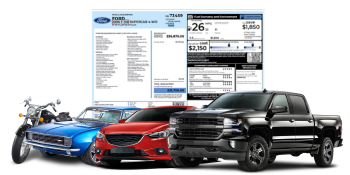You’ve probably heard the terms “torque” and “horsepower” tossed around when talking about cars. But what do they mean, and why should you care? If you’re shopping for a vehicle, these metrics might feel confusing.
Misunderstanding them could lead to picking the wrong car for your needs, but it doesn’t have to be complicated. In this guide, we’ll explain torque and horsepower in simple terms and how they impact performance.
Tools like the window sticker lookup by VIN provide detailed information on any vehicle’s engine specifications, including torque and horsepower. Knowing these can help you buy a car that suits your driving experience.
RELATED: Fuel Efficiency in Cars: Definition & Importance
What is Torque?
Torque is a measure of rotational force. Imagine using a wrench to tighten a bolt. The harder you push on the wrench, the more torque you apply. In cars, torque measures how much force the engine can produce to turn the wheels.
More torque means stronger pulling power. It’s what helps a truck tow a heavy trailer or a car climb a steep hill. Vehicles with high torque excel at handling loads and accelerating quickly from a stop. That’s why you’ll often hear torque mentioned when discussing trucks, SUVs, and performance vehicles.
For example, diesel engines are known for their high torque, which makes them ideal for towing and hauling.
What is Horsepower?
Horsepower measures the rate at which an engine can work. It tells you how fast a vehicle can go or how much power it can deliver over time.
Think of it like this: torque gets you moving, but horsepower keeps you moving faster. It plays a significant role in achieving high speeds and maintaining power at higher RPMs (revolutions per minute).
Horsepower is the star if you love speedy sports cars or smooth highway cruising. Vehicles with high horsepower can deliver thrilling performance, making them favorites for racers and enthusiasts.
The Relationship Between Torque and Horsepower
Torque and horsepower are closely connected. Here’s the math:
Horsepower = (Torque × RPM) ÷ 5252
This formula shows that torque and horsepower depend on each other. At lower RPMs, torque dominates, helping with acceleration and heavy loads. As RPMs increase, horsepower takes over, driving top speed and maintaining power.
For example, sports cars balance torque and horsepower to deliver fast acceleration and top-end speed. Meanwhile, heavy-duty trucks focus more on torque for pulling power.
RELATED: What is MSRP For Cars
How Torque and Horsepower Affect Driving Experience
Both metrics influence how a vehicle performs in real-world driving. Here’s how:
- Towing and Hauling: Torque is king here. High-torque vehicles can tow heavier loads without straining the engine.
- Acceleration: If you want quick takeoffs, torque delivers the low-end power needed for a fast start.
- Top Speed: Horsepower takes the lead at high speeds. It keeps the car moving quickly once you’re already in motion.
- Fuel Economy: Vehicles with balanced torque and horsepower often achieve better efficiency, depending on how they’re driven.
Understanding how these metrics impact driving helps you choose a car that fits your lifestyle.
Choosing a Vehicle Based on Torque and Horsepower
When buying a car, think about your driving habits and needs.
- For city driving or commuting: Look for a vehicle with a balance of torque and horsepower.
- For towing or off-roading: Prioritize torque. A high-torque engine handles heavy loads and rough terrain better.
- For speed and thrill: Go for horsepower. Sports cars and performance vehicles focus on delivering high power at high speeds.
Always check the vehicle specifications. Our window sticker lookup tool makes it easy to compare torque and horsepower across different models.
How Window Stickers Lookup Helps
Understanding torque and horsepower is crucial, but finding reliable information can be tricky. That’s where our tool comes in.
A lookup window sticker by VIN provides detailed vehicle specifications, including torque, horsepower, engine type, and more. Whether you’re buying new or used, you can access accurate information to make an informed choice.
Simply enter the vehicle’s VIN (Vehicle Identification Number), and you’ll unlock a wealth of data, including the original window sticker. It’s perfect for ensuring the car you’re eyeing meets your performance needs.
Conclusion
Torque and horsepower are more than just buzzwords—they’re key to understanding a car’s performance. Torque gives you pulling power and quick acceleration, while horsepower ensures speed and sustained performance. By evaluating both metrics, you can choose a vehicle that suits your needs, whether it’s towing, commuting, or enjoying weekend thrills.
Frequently Asked Questions
Which is more important for everyday driving, torque or horsepower?
It depends on your needs. Torque helps with acceleration and carrying loads, while horsepower boosts speed and performance.
How do torque and horsepower impact fuel efficiency?
Balanced torque and horsepower can improve efficiency. However, high output in either can reduce fuel economy, depending on driving habits.
Can you increase both torque and horsepower in a vehicle?
Yes, you can modify the engine or use performance upgrades to enhance both metrics. Consult a mechanic for safe options.








